At the start of his second term in office, U.S. president Donald Trump signed a series of executive orders decrying “gender ideology,” incorrectly equating sex assigned at birth with gender, and banning access to gender-affirming medical care for trans people under 19. These executive orders also instruct federal agencies to refuse to alter gender markers on government-issued identification and suspending passports with the gender-neutral X identifier. This vehement anti-trans policy coming right from the White House emboldens anti-LGBTQ2S+ hate and misinformation throughout the country. All of this has left many LGBTQ2S+ Americans afraid and uncertain about the future, with many seriously considering whether other countries like Canada may be a viable safe alternative.
Aleks Dughman-Manzur, co-executive director of Rainbow Refugee Society, an organization that provides support to LGBTQ2S+ asylum seekers, tells Xtra that since the beginning of Trump’s second term, their organization has received over 1,000 emails from LGBTQ2S+ U.S. citizens inquiring about how they can claim asylum in Canada. Dughman-Manzur explains: “It’s not hard for [U.S. citizens] to cross the border—you just need a passport … However, once you’re here trying to find a pathway to stay permanently in Canada, it may look very different.”
While Canada has been a long-standing destination for LGBTQ+ refugees globally from around the world, there is limited precedent of U.S. citizens being approved for refugee status here.
Adrienne Smith, principal lawyer at Smith Immigration Law based in Toronto, is seeing two main categories of people currently looking to migrate: “One of the biggest ones is the concerns that they or their child won’t have access to gender-affirming healthcare. The second is the concern that individuals won’t have a passport or a travel document that reflects their gender.”
To qualify for an asylum claim, U.S. citizens have to prove that there is no safety from the type of persecution they face, like denial of access to gender-affirming care, denial of a travel document or violence from an individual, in the entire country. This is known as the “internal flight” option, which means proving in court that traditionally more LGBTQ2S+-friendly states like New York and California are also not safe for queer and trans people. For the majority of cases, this rules out the ability of U.S. citizens to make refugee claims in other countries.
Swathi Sekhar, director of Protection Initiatives at Rainbow Railroad, a global not-for-profit based in the U.S. and Canada that helps LGBTQ2S+ people facing persecution for their identities, stresses that there are consequences to making a refugee claim that many people are not aware of. “Making a refugee claim is a lengthy process. It can take anywhere between one to five years—our system is very backlogged. Then while [the refugee claimant is] in Canada they can’t move anywhere, they can’t leave the country, they can’t go back to the U.S. for any reason. If your mother is sick, or you have a wedding, you can’t just go into the U.S.,” Sekhar says.
While there are a couple of very specific cases in which refugee claims of LGBTQ2S+ U.S. citizens coming to Canada have been successful, there is no guarantee that similar cases will be approved. Smith says that she is currently not recommending that LGBTQ2S+ Americans pursue refugee claims as a viable option for coming to Canada.
Aside from refugee claims, there are a number of other pathways for U.S. citizens to immigrate to Canada. The main one is the economic pathway. If someone has a job offer in Canada, they can apply for a work permit at the port of entry. People who meet a certain number of points according to their French-language skills, level of education, age and work experience in Canada may also be able to apply for permanent residence. A secondary pathway is family sponsorship: people who have a Canadian partner in a “marriage-like” relationship may be able to have the partner sponsor their immigration to Canada. In the last six months, the Canadian Liberal government has introduced new restrictions on its immigration policy, which has led to a decrease in the number of study permits—a potential way for students to enter the country—that Canada is permitting.
There are currently no special pathways being carved out to account for the significant increase in queer and trans U.S. citizens who no longer feel safe in their country and are looking for alternatives.
U.S. citizens have a greater chance of obtaining Canadian citizenship if they have family history in Canada. This follows a 2023 court decision that the first-generation limit on obtaining Canadian citizenship by descent was unconstitutional. Smith says that Canadian citizenship based on descent used to require that one of your parents was born in Canada. She explains that now how it works is that “if you can prove your Canadian lineage going back as far as your birth records, then you can apply for Canadian citizenship by descent.” This change is set to take effect in November 2025, so the old requirements are currently still in effect.
All of this means that while there are slightly more options for people obtaining Canadian citizenship in some cases, there are currently no special pathways being carved out to account for the significant increase in queer and trans U.S. citizens who no longer feel safe in their country and are looking for alternatives.
The sudden policy changes in the U.S. following the beginning of Trump’s second term in office, and especially the rapid pulling of funding for organizations like USAID, which used to fund LGBTQ+ organizations and HIV medications, has had a devastating effect on queer civil society around the world. This shift in policy has emboldened many already homophobic governments and is putting pressure on queer people globally. On top of this, Sekhar notes that the U.S. has played a significant role in taking in refugees from across the world in past decades. Now, with Trump’s sudden policy changes, many of these refugees are facing the possibility of deportation back to their home countries. For LGBTQ+ refugees fleeing countries with severe homophobic policies, this means being sent back to places where they could be killed for their identities and practices. Sekhar also emphasizes concern that refugees are being sent to new U.S. detention centres in El Salvador where they are unlikely to receive any due process.
However, Canada still maintains its Safe Third Country Agreement (STCA) with the U.S., which recognizes the U.S. as a safe country for refugees and makes people entering Canada from the U.S. land border ineligible from making refugee claims in Canada. This means that LGBTQ+ refugees who have already come to the U.S. from other countries cannot leave to seek safety in Canada even if they are facing deportation back to countries where they may be killed for their gender and sexual identities.
Sekhar sees a strong argument that the U.S. is in reality not a safe country for refugees in general, and that it is particularly unsafe for LGBTQ2S+ refugees. She tells Xtra that “we are already seeing that queer and trans people are being deported back to countries where they actively face a risk of death, persecution or imprisonment.”
According to the refugee support organization Bridges Not Borders, if asylum seekers are able to cross into Canada from the U.S. in secret and remain in hiding for 14 days, they can make an asylum claim that bypasses the STCA. Dughman-Manzur says that this puts refugees at significant risk as many have to rely on smugglers to get across the border and remain in hiding: “We don’t know what those 14 days might look like for them. There’s a lot of risk of sexual violence and trafficking.” They also explain that “some people are crossing on their own in weather conditions and conditions of the land that put their lives at risk and we have seen deaths.”
“While we are able to oppose the U.S. when it’s touching our pockets, are we able to oppose the U.S. when it’s touching human rights?”
With the Trump administration’s increasingly harsh treatment of refugees, a growing number of Canadian-based refugee support organizations are calling on the government to end the STCA, or at the very least to begin making exceptions for those who are at higher levels of risk such as LGBTQ+ refugees. This revaluing of Canada’s assessment and relationship to the U.S. has already been happening at the economic level with millions of Canadians rallying behind buying Canadian and boycotting U.S. companies in response to Trump’s tariffs. Dughman-Manzur expresses hope that Canadians might go beyond boycotting U.S. products and start standing up for people in the U.S. who are being forced to flee due to Trump’s policies: “While we are able to oppose the U.S. when it’s touching our pockets, are we able to oppose the U.S. when it’s touching human rights?”
While queer and trans people in the U.S. are looking to Canada as a possible safer alternative, activist and executive director of the Society for Queer Momentum (and Xtra contributor) Fae Johnstone notes that in Canada, “ahead of the election to cue distance from Justin Trudeau, our now prime minister [Mark Carney] did not include a minister of women and gender equality in his cabinet and that’s a concerning cue.” While Carney did eliminate the cabinet position of minister of women and gender equality upon taking office, he has since reversed this move after receiving pushback from feminist organizations.
Recent years in Canada have seen a rise in anti-LGBTQ2S+ sentiments across the country with specific anti-trans legislation being introduced in Saskatchewan, New Brunswick and Alberta. While the political tone in Canada is moving in concerning directions, the country is still far from where the U.S. is currently at. But still, Johnstone warns that portrayals of Canada as a utopia totally free from anti-LGBTQ2S+ hate doesn’t give migrants a realistic portrayal of what the situation in the country is really like: “If you are a newcomer queer or trans person settling into the Canadian context, if that’s the story you’ve been told, it’s a half true story. We’re doing some great work, but if that’s the story you’re told when you encounter racism, xenophobia, homophobia, transphobia, that’s a whiplash of its own.”
Canada does have specific protections for gender identity and expression in the Canadian Human Rights Act and Criminal Code, which may help to slow the undoing of rights if federal politics were to take a sudden anti-LGBTQ2S+ turn. On top of this, a relatively queer-friendly cultural climate with many organizations committed to advocating for the protection of queer and trans rights will also mean significant pushback to anti-LGBTQ2S+ policy on the federal level and in provinces where this advocacy is strongest.
The situation for LGBTQ2S+ people in Canada will continue to change in response to rapid policy reversals in the U.S. and rising anti-LGBTQ2S+ politics domestically. If Canada is to remain and develop as a safe place for queer and trans people, it’ll be up to Canadians to pressure our government and fight to keep and expand what protections we do have. As Canadians come together in the face of U.S. tariffs and threats to the country’s sovereignty, Dughman-Manzur says they want people to think about how “every single person who is in Canada is a part of Canada. How can we extend solidarity to each other while we’re going through hard times and make sure no one is left behind?”


 Why you can trust Xtra
Why you can trust Xtra


